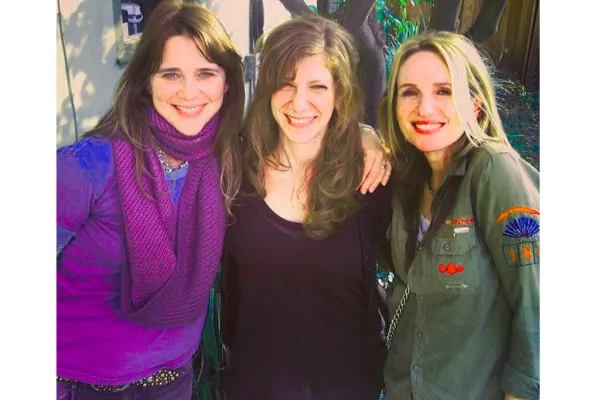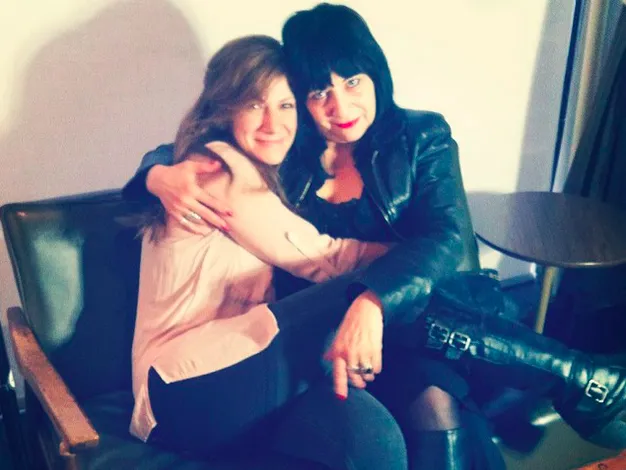Redressing Rock History: Tanya Pearson AC Creates “Women of Rock” Collection at Smith
Research & Inquiry

Published October 14, 2015
Ada Comstock Scholar Tanya Pearson is on a mission to right the wrongs of rock ’n’ roll history.
While doing research on women rock musicians of the 1990s for a symposium on the history of censorship last year, Pearson discovered a “frustrating lack of information” about the pioneering all-female bands she had followed as a teenager.
She tried Googling L7, for example, a grunge metal band from Los Angeles, “and nothing came up,” Pearson said. “They were as influential as Nirvana in the 1990s, and yet there was nothing there.”
Pearson set out to close the musical gender gap by collecting oral histories of influential women rockers. The project began as an independent study with Kelly Anderson, an oral historian in the Smith libraries, and it became Pearson’s senior capstone project as an archives concentrator.
Pearson has spent close to a year interviewing women rockers who emerged from the 1970s to the late 1990s and transcribing their stories for a new “Women of Rock” section of the Sophia Smith Collection at Smith. Her subjects have included No Wave pioneer Lydia Lunch, punk rocker Alice Bag and members of the alt-rock band Veruca Salt—among others.
Pearson hopes the collection of video interviews and written transcripts—which should be available sometime this month—will help change the prevailing view of women as second-class citizens of rock ’n’ roll.
“Rock music has become this inherently masculine entity where women are seen as an anomaly and their creative output as less authentic than that of male-fronted bands,” Pearson said. “My goal is to start an oral history collection by women, for women, that represents individuals who’ve been left out of the popular rock narrative.”
Pearson’s project got an important boost when she was selected this summer as the first recipient of Smith’s new Rosenthal Fellowship program. Founded by alumna Zoe Feldman ’06 in honor of the late Rebecca Samay Rosenthal ’07, the program supports internships and capstone research projects by students in the archives and book studies concentrations at Smith.
Rosenthal was keenly interested in special collections, having worked as a student intern in the Mortimer Rare Book Room.
“She loved working with the papers of Sylvia Plath and the entire process of archiving,” said her father, Bob Rosenthal. “It set her on a path.”
Before her untimely death in 2012 at age 27, Becca Samay Rosenthal was studying for a master’s degree in library and information science at Simmons College.
Rosenthal was also interested in music promotion, her father noted—especially in discovering and promoting the work of new, unknown artists. A year after she died, her friends—author Neil Gaiman and Amanda Palmer (of the punk-cabaret duo Dresden Dolls)—organized a benefit concert in Somerville, Mass., to help raise funds for the new fellowship at Smith. (Palmer is among the women Pearson is interviewing for the oral history collection.)
Bob Rosenthal said his daughter would be pleased that her legacy at Smith helps support student archival projects—starting with Pearson’s Women of Rock collection.
“Becca’s love of language, writing and discovering new musical artists is captured perfectly by the creation and continued existence of the fellowship,” he said.
The Rosenthal program provides students with up to $1,500 for internships related to their academic concentrations, and up to $1,000 for travel and other expenses related to capstone projects in book studies and archives.
The program has enabled Pearson—who still plays in bands and books rock shows in Boston and Western Massachusetts—to expand her interview list and create online video links for the new Women of Rock collection.

Ada Comstock Scholar Tanya Pearson (left) and No Wave pioneer Lydia Lunch.
“Everyone I’ve interviewed is so grateful I’m doing this,” Pearson said. “They don’t want to have to keeping saying ‘we’re angry because nobody knows who we are.’”
Most of the musicians Pearson has interviewed began performing before the era of online media—which means their work doesn’t show up in Google searches or on YouTube.
Despite the influence many of these women have had on American music, “one of the most surprising things I’ve found is how small some of the scenes were at the time,” Pearson said. “The largest crowd Lydia Lunch played to was maybe 30 people.”
What was it like to interview musicians she has admired for so many years?
“It was amazing to be able to ask my idols specific questions,” Pearson said with a smile. “I don’t know how I held things in. I guess I come across as a cool, calm person because some of them didn’t realize I was a fan.”
Some of Pearson’s interviewees will be featured in a discussion on “Righting the Wrongs of Rock History” that Pearson is hosting Thursday, Oct. 22, at 7:30 p.m. in the Campus Center Carroll Room. Panelists are June Millington, Kristin Hersh, JD Samson, Julie Cafritz, Alice Bag and Kim House. The event, which is open to the public, will be followed by a reception with the musicians.
In a related event, celebrated rock critic Jessica Hopper will give a public lecture on campus Monday, Oct. 26, at 7:30 p.m. in Graham Hall at Hillyer. Hopper, a leading voice in contemporary rock criticism, recently published a collection of her writing, The First Collection of Criticism by a Living Female Rock Critic. She is also an editor at the influential online magazine Pitchfork.com.
Kelly Anderson, whose oral history class helped inspire Pearson’s project, said the Women of Rock collection will have an impact for years to come.
“Oral history is one of the best ways to diversify and democratize women’s history,” Anderson said. “Tanya is leaving us a gift that will last way beyond her time here at Smith.”
Karen Kukil, associate curator of special collections at Smith, said Pearson’s work also dovetails perfectly with the college’s existing women’s music collections.
“The wonderful thing about oral histories is that you get stories that haven’t yet been written down,” Kukil said.
By collecting the stories of women musicians, Pearson says she hopes to expand the rock canon beyond “a few female figureheads like Patti Smith, Debbie Harry and Courtney Love, who are supposed to satisfy an unspoken quota.”
“I just want to keep doing this forever,” added Pearson, who is considering applying to graduate school for public history. “It’s an opportunity to give women a voice.”
Applications are being accepted through November 1 for Rosenthal internships, while capstone funding is an open enrollment process with no deadlines.
Elizabeth Myers, director of special collections at Smith, said the college looks forward to supporting more projects in the future through the program.
“We want to continue to enable students like Tanya to do incredibly important work—work that furthers their own knowledge, helps meet curriculum requirements and supports the archives and books concentrations,” Myers said.
Ada Comstock Scholar Tanya Pearson (center), flanked by members of the band Veruca Salt, who are among the women Pearson interviewed for a new oral history collection at Smith.